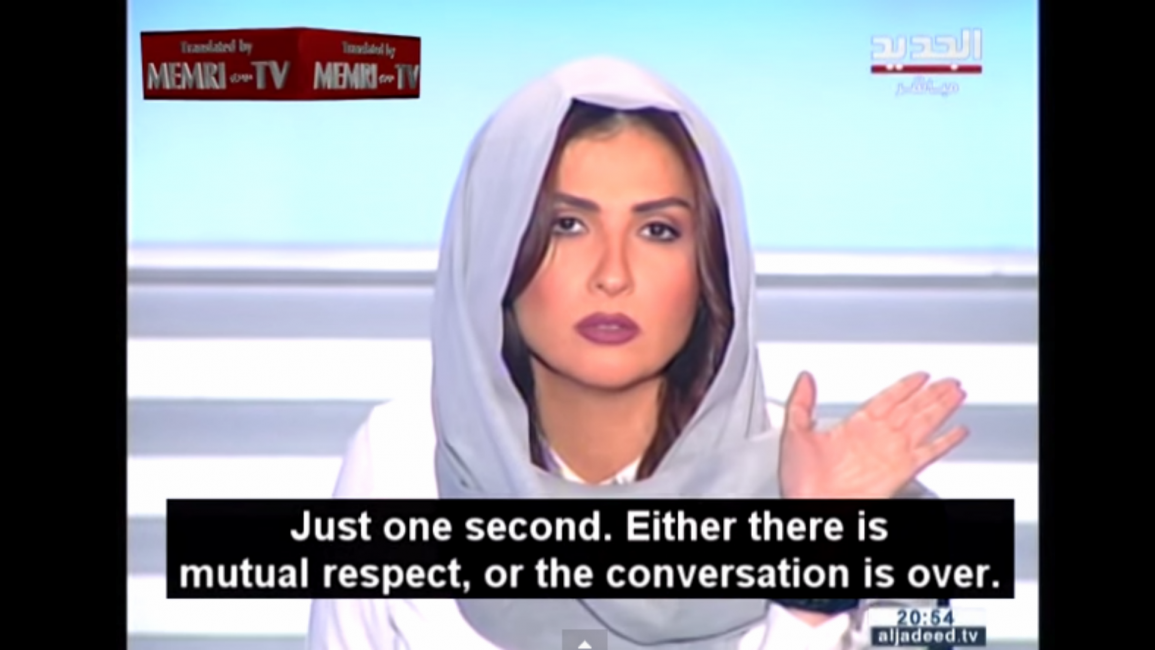
Arab women asserting their authority on TV? It's normal
Arab women asserting their authority on TV? It's normal
And here are four videos to prove it.
3 min read
A video of Lebanese journalist Rima Karaki enforcing her authority went viral (YouTube)
Based on the reaction to a video that has gone viral over the last few days, it appears that people are shocked that female Arab presenters are able to shut up rude guests and do their job of moderating discussions.
If you were among those surprised, then you need to watch more Arab television. From Morocco to Qatar female journalists host news shows, interviewing top political, cultural and religious personalities, and have done for years. When necessary they have reminded male guests who is in charge on their show.
If you like what you see learn Arabic, sort yourself out with Arabsat, Nilesat or Hotbird, and feign indignation when massive arguments breakout live on air.
Ghada Owais
During the height of Israel's 50-day war in Gaza last summer, Arabic-speaking Israeli journalist Mounir Cohen was invited on to Al-Jazeera Arabic to discuss the conflict. While there he came up against Lebanese presenter Ghada Owais. As things got slightly heated Cohen made the mistake of telling Owais to "calm down", and he patronised her saying that being "worked up" is not the way to have a discussion.
Owais proceeds to school Cohen when he tells her Hamas is the Islamic State group (IS, formerly Isis). She pointed out that IS would kill Hamas leader Khaled Meshaal if it got the chance. Basic Islamist ideology, Mr Cohen.
If you were among those surprised, then you need to watch more Arab television. From Morocco to Qatar female journalists host news shows, interviewing top political, cultural and religious personalities, and have done for years. When necessary they have reminded male guests who is in charge on their show.
If you like what you see learn Arabic, sort yourself out with Arabsat, Nilesat or Hotbird, and feign indignation when massive arguments breakout live on air.
Ghada Owais
During the height of Israel's 50-day war in Gaza last summer, Arabic-speaking Israeli journalist Mounir Cohen was invited on to Al-Jazeera Arabic to discuss the conflict. While there he came up against Lebanese presenter Ghada Owais. As things got slightly heated Cohen made the mistake of telling Owais to "calm down", and he patronised her saying that being "worked up" is not the way to have a discussion.
Owais proceeds to school Cohen when he tells her Hamas is the Islamic State group (IS, formerly Isis). She pointed out that IS would kill Hamas leader Khaled Meshaal if it got the chance. Basic Islamist ideology, Mr Cohen.
Reham Saeed
In 2013, Egyptian TV host Reham Saeed was discussing the topic of religiously-sanctioned treatments and their potential abuse by practioners,when her guest, Sheikh Yousef Badri, objected to a question and began angrily asking an off-screen producer why she was asking him it. "Talk about things that are important to people," Badri berated Saeed.
Bad move. "From the moment you sat down on that chair you have talked down to me… yet you're taking 1000 Egyptian Pounds to come on… Should a religious preacher ask for 1000 Egyptian Pounds?"
Saeed takes off the scarf she was wearing out of respect for Badri, and tells him that she will not wear it for him. "I'll wear it for my Lord and not for anyone else," Saeed says before walking out.
Amal Arab
In February, a stampede during a match involving the Egyptian clubs Zamalek and ENPPI resulted in the tragic death of at least 22 people. The tragedy raised many quetions: Why was tear gas used against fans? Why were there apparently not enough tickets for the fans? Al-Araby’s Algerian presenter, Amal Arab, asked Zamalek's club president, Mortada Mansour, these questions. Mansour was not happy.
"I'm telling you, talk with respect," Mansour bizarrely tells Arab, who had been quite calm in her questioning.
In a dignified manner Arab asserts who is in charge. She tells Mansour to "lower his voice" and that he is "on a respectable channel". "Listen to me," Mansour tells Arab, before Arab says she is listening, but that she has "a right to ask a question" when she deems it necessary. Mansour rants a bit more but soon decides that it is better to just answer the questions.
Dina Abdel-Rahman
In late 2011, Dina Abdel-Rahman, a presenter on the Egyptian television channel Tahrir, was hosting Fouad Fayoud, a 'military analyst'. The topic of discussion was a recent army crackdown on protests in Cairo that left a number of demonstrators dead.
Defending the security forces, despite multiple sources saying they had fired on peaceful protesters, Fayoud denies seeing any evidence security personnel shot people. Abdel-Rahman then shows him a picture of an officer firing a gun, which Fayoud argues was "a personal weapon". "A water pistol?" Abdel-Rahman responds sarcastically.
Fayoud swore that no army officer could ever fire on an unarmed Egyptian, before being shown proof of it. Trying to grasp for an answer he falls silent, before eventually asking why Abdel-Rahman could not talk about more positive things, instead of "martyrs, death and revolutionaries".


